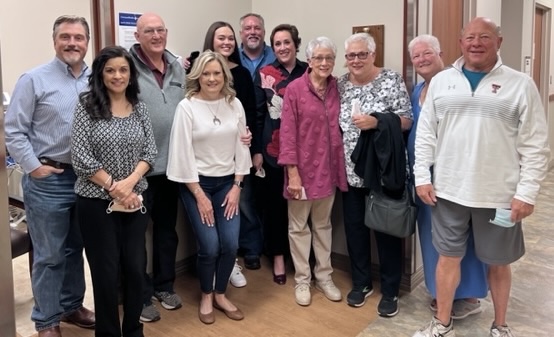One of the lowest points in Ann Stegall’s journey through breast cancer was at a convenience store while driving home from Houston’s MD Anderson Cancer Center after a double mastectomy.
(Photo above, Ann Stegall surrounded by family, friends and colleagues after ringing bell, signifying end of radiation treatments.)
The surgery two days earlier was also a turning point – though Ann didn’t know it yet.
The surgery and treatments got rid of the cancer and it’s still gone more than a year later, even though there’s no certainty after a cancer diagnosis.
Ann decided to share her story during October’s Breast Cancer Awareness Month, because every time she does, someone she knows schedules a mammogram. She’s is a very private person but began sharing some of her ordeal on Facebook, because she knew people would see her in person and know she was ill once she lost her hair.
One woman told her it had been four years since her last mammogram.
“That made me cringe. Because if I hadn’t had a mammogram when I did, where would I be now? Would I be dead? Would it be so far along that there was no going back?”
One of her friends discovered she had stage 1 breast cancer and doctors were able to treat it with a lumpectomy and radiation.
Breast cancer killed 42,273 women in 2020, the latest available statistics from the U.S. Centers for Disease Control and Prevention. Doctors diagnosed 239,612 new female breast cancers that year. The 5-year cancer-free survival rate is 67 percent.
“I am not brave. I’m not special. I’m not any of those things. Life gave me no other choice. People do hard things when they have no other choice,” Ann said.
A painful ride back to Lubbock
The weather was hovering near 100 degrees on Wednesday, July 21, 2022 — hot and sticky — and Ann remembers feeling every highway bump on the post-surgery drive back to Lubbock.
“It was so painful. Just the movement of the car made it so very difficult,” said Ann, a partner at McCleskey Law Firm. The Lubbock native joined the firm in 2002.
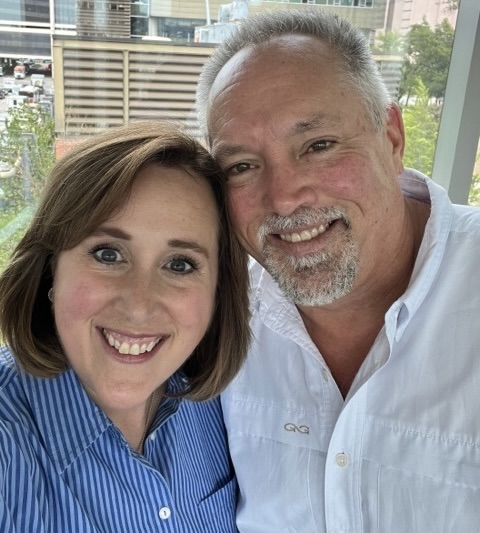
She and her husband, Brett, had stopped for gas and a bathroom break. He had to help her out of the car. The surgeon had removed her breasts and all the lymph nodes under her right arm. The upper body muscles she needed to rotate her body and pull herself out of the car weren’t fully functioning.
“I was extremely sore and was struggling,” Ann recalled. “I didn’t have much hair. It was obvious I was sick.”
They got some drinks and brought them to the counter, but the clerk shook her head. The sodas were on the house. “The sweet little store clerk, said, ‘It’s OK. No charge.’”
Telling the story made Ann cry as it did then. She dabbed her eyes with a tissue in her office above 50th Street and University Avenue.
“I got to the car and I just cried and cried, because I knew how terrible I looked, how feeble I appeared. I was obviously a cancer patient. But it wasn’t all bad, because I was alive. I am alive.”
Later that week her surgeon’s physician assistant called to say they thought they’d removed all the cancer. Two of the removed lymph nodes showed signs of disease, but the rest were clear.
“She thought the results of the chemo were excellent. They were really pleased with how everything turned out.”
‘I didn’t think anything was wrong’
Almost a year earlier – Nov. 8, 2021 – Ann kept her annual mammogram appointment.
“I felt great. I didn’t think anything was wrong. I hadn’t felt a lump. It was just time to go for a mammogram and so I did.”
Later in the week she took a call from her doctor while in a business meeting. They found a spot on the exam, but the doctor said it was probably dense breast tissue, no cause for alarm. But she needed to go back for another mammogram and an ultrasound.
“I didn’t think much about it until later and I got nervous. I should have asked more questions, but I was so busy with the meeting. Later, when I wasn’t so preoccupied with work, I got a bad feeling.”
When she talked to her husband, he encouraged her, reminding her they didn’t have anything to worry about right now.
Ann had to wait to be retested. Two weeks crawled by. She had the additional exams two days before Thanksgiving.
It wasn’t good news.
When the doctor came into the room to deliver the probable cancer diagnosis, his words blurred and didn’t make sense.
Alone in the exam room, she heard cancer, a lymph node was involved, and she needed a biopsy. She immediately asked for her husband, waiting outside the screening room.
‘It was the scariest time of my life’
“I was so lost in the words. I’m trained to listen carefully and I couldn’t comprehend what he was telling me. I had to have my husband listen so we weren’t relying on my memory of the diagnosis and biopsy plan. It was the scariest time of my life and most definitely the scariest Thanksgiving of my life,” she said.
She told her children.
“It was one of the hardest things I’ve ever had to do. They were panic-stricken,” Ann said. Daughter Caroline had a close friend whose mother died of pancreatic cancer. Caroline’s mind leapt to the worst-case scenario. She was getting numerous acceptance letters for colleges she hoped to attend, but told her mother she’d stay home to help. Ann told her she needed to follow her plan to go away to school.
Ann served a traditional meal and had the company of her extended family, but just couldn’t focus. Her husband kept reassuring her and kept hoping the doctors were wrong.
“I couldn’t get my mind off of it. It was leading me down some really dark alleys. Is this my last Thanksgiving? Will I have another one?”
More waiting. She couldn’t get the biopsy until after Thanksgiving.
Then while driving her son, John, then 15, to school the first Thursday of December, her doctor called with the biopsy results.
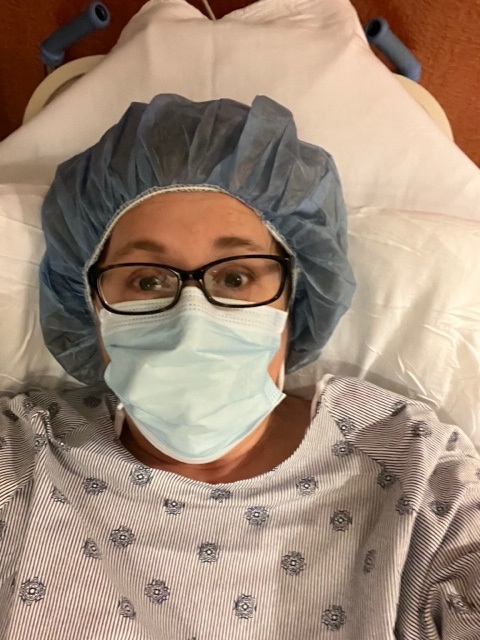
Her OB/GYN confirmed Ann had cancer but did not have the specifics of the test results — like the kind of cancer or what stage it was.
She wishes now she hadn’t answered the phone with her son in the car. Both of them were distraught. She also wishes she would have taken him back home with her, but dropped him off because he had to prepare for finals.
“I said, ‘you’re going to be OK. I’m going to be OK. We’re going to take care of this,’ while not fully believing that in my own head but trying to comfort him.”
Then everything sped up. Within 10 minutes she got appointments for her local cancer team and soon a referral for MD Anderson in Houston. Her mother, who’d had lymphoma, received her treatment there.
“I didn’t know anything, other than they are the best and I wanted to go there.”
After dropping John off, she parked and called Brett to tell him the news. Ann, an only child, wanted to tell her parents in person.
“That was hard. My mother just kept saying, ‘I wish it was me,’” she said.
Ann went to work to finish some tasks and told her direct staff and her law partners.
“I was really shell-shocked. I just sort of told them what was happening, but I didn’t have any understanding of what this all meant. Did it mean I was going to die? Did it mean I was going to have to quit practicing law?”
Her partners prayed with her, offering to help however they could.
“It was such a jarring time. I didn’t really want anyone to know. I had a hard time talking about it.”
Ann didn’t know what her future held. The couple revised their wills, written when their children were younger. Her stepdaughter Lauryl was now an adult, Caroline would soon be attending Baylor and their youngest, John, was in high school.
“The fear wasn’t for myself, but for my children, my husband and my parents. I was petrified of leaving my kids. I know how much I have needed my mother over the course of my life and was terrified of not being there for them. My husband is wonderful and while he could manage without me, I did not want to leave him. And being an only child, I was worried who would care for my parents later in life if something happened to me.”
“I didn’t even know enough before my appointments to ask what kind of breast cancer I had,” she said. “I didn’t know there were multiple kinds of breast cancer.” When a friend asked her, she had to search her medical chart online for the answer.
Some good news
The next week a local surgeon said she had stage 2 breast cancer, meaning it hadn’t spread to other parts of her body. The next day she met with a local oncologist, who felt confident she’d make a full recovery.
Ann had the most treatable kind of breast cancer — ERPR positive. The cells on the cancer tumor had estrogen and progesterone hormone receptors telling it to grow. It also meant those receptors made it easier to target the tumor with treatment.
The Stegalls trekked to Houston to consult with her cancer team there. The doctors agreed with her Lubbock doctors. Her team of breast cancer specialists at MD Anderson were among the best in the world and that relieved some of her worry.
Not knowing was mentally and emotionally challenging, but the following treatments — 16 chemotherapy treatments, a double mastectomy, radiation and reconstruction surgery — often seemed unbearable to the 46-year-old woman, who had two children still at home and a law career.
Ann completed chemotherapy and radiation in Lubbock and two surgeries in Houston.
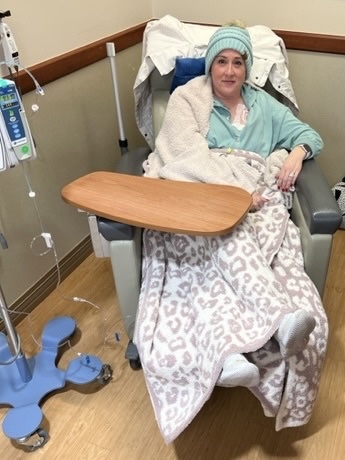
The doctor administered the first set of chemo drugs, aptly called Red Devil, at the hospital.
She had chemotherapy every three weeks for 12 weeks and wore a pump home for three days for each round.
“It makes you feel terrible. Before the first chemotherapy administration, I didn’t know how long I was going to feel bad after each treatment,” she said. Ann discovered she’d feel ill for about a week after each chemotherapy treatment before she returned to feeling mostly normal.
The medicine couldn’t touch her skin and it made her so toxic she couldn’t share a bathroom or beverages with anyone. They gave her a shot for bone pain, a known side-effect.
‘That was the most traumatic thing for me’
Then – two weeks into treatment – her hair started falling out.
“That was the most traumatic thing for me. I knew it was going to fall out, they told me it would fall out. I just hoped I might be different, an exception. I was expecting it to occur, but when my hair started shedding, I was overwhelmed and horrified. I had long hair that became a tangled mess because of the shedding. I couldn’t brush it or more would fall out. I have a picture of it in the trash can.”
Her hairdresser cut it into a short pixie, a limited solution. A few days later, the haircut was so patchy she went back to the salon and her hairdresser shaved it off.
“We sat there and cried — my hairdresser, my mom and I.”
Ann bought a wig, but it was too uncomfortable to wear for very long. She found the wigs to be tight and itchy. Wigs were also difficult because her scalp was tender and painful after her hair fell out.
She had extreme fatigue.
But she didn’t miss activities for her daughter’s senior year or driving her son to school.
“I didn’t want my kids to see me sick. I was not about to miss taking John to school. I didn’t want him to know how bad I felt, but there were a couple of mornings — I would get him to school, get home and be overcome by the nausea. One morning I made it to the backyard before I threw up. The car ride made me so nauseous,” she said.
The second chemotherapy drug, Taxol, wasn’t as evil as Red Devil. Some of her hair started to come back. She finished chemotherapy the end of June, 2022.
“Only my husband knew how sick I was, how traumatized from my hair falling out and how tired I was. He saw me through the worst of it. I couldn’t have made it through the treatments without him.”
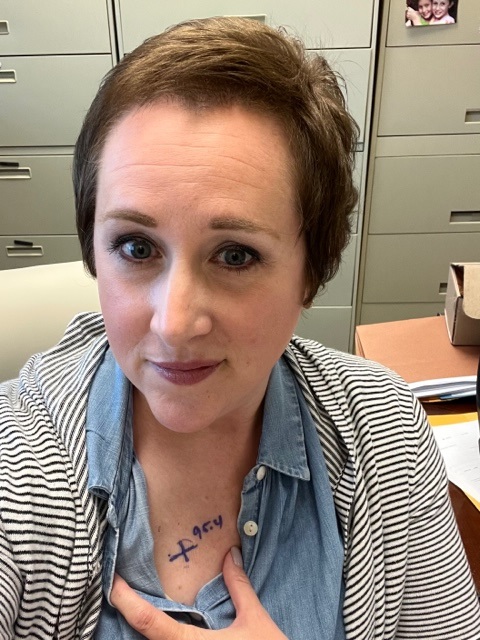
Genetic testing
During treatment, she was offered genetic testing.
Ann discovered she had a genetic mutation increasing her risk of breast cancer by 40 percent. Although her mother had lymphoma and her maternal grandmother had colon cancer, her father’s side carried the gene.
She discovered two great-aunts had breast cancer.
Ann wishes the test was available when she was younger. She could have made better decisions reducing her risk of breast cancer — like not taking birth control and having her ovaries removed after she had her children.
Knowing about the genetic mutation led to an important decision.
Her doctors wouldn’t tell her what to do, although she wished they would. Ann decided to have a double mastectomy, instead of a lumpectomy, believing it improved her odds of not having the cancer return.
“I cannot live with the fear of recurrence. I had to have it for my own mental health,” she said.
Ann had the surgery July 19, 2022, two days before the long car ride home.
Back in Lubbock, she’d come to her office a couple of hours a day, working her way back to working full time. She completed physical therapy so she could drive and dress herself.
In September she started radiation — five days a week for six weeks. Although Ann felt fatigued, she didn’t have radiation side effects like some others do.
“It was time consuming. In October, I had 24 appointments in 14 days. I felt like I lived at the doctor’s office,” she said.
Finally, Ann finished and rang the bell at the treatment center – surrounded by friends and family – signaling the treatment phase was over.
‘I felt good again’
By December, her hair had grown back to a short pixie.
“I felt good again. My appearance no longer gave away that I had been sick.”
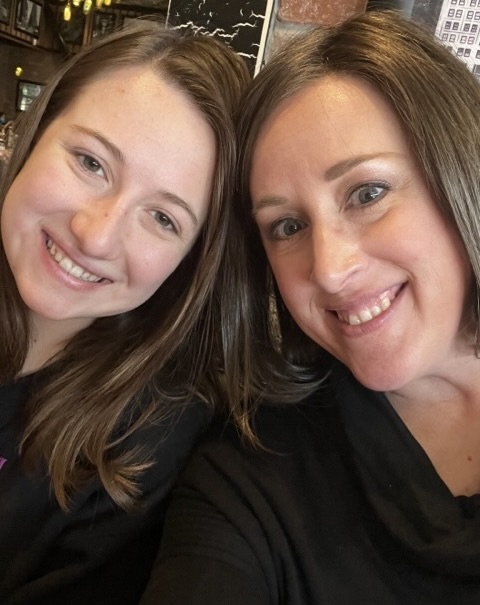
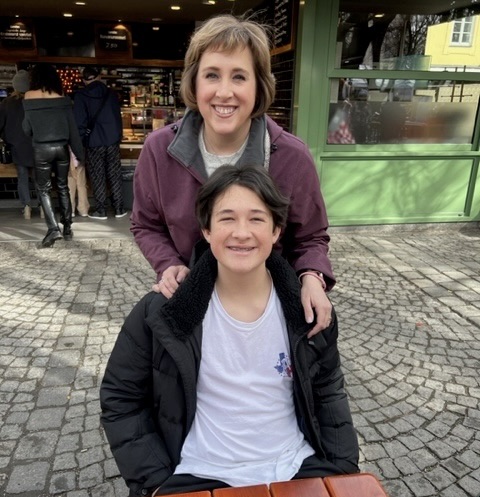
Ann took some trips in what she called her revenge tour. She took Caroline to New York City for a belated high school graduation present. Son John joined her and a cousin on a trip to Europe. The entire family spent a week in Hawaii.
The final surgery on August 22 of this year reconstructed her breasts with tissue from her stomach. Although she was warned it was more difficult than the double mastectomy, she had an easier time with it.
“I could move my arms really well. With the double mastectomy, I lost a lot of range of motion.”
On the trip back from Houston — hot and muggy like the year before — no one offered her a free drink at a convenience store. They stopped for breakfast in Waco with Caroline, and much to her delight, no one noticed she was recovering from surgery.
The cancer is gone, but Ann doesn’t feel she’s back to her normal life before the diagnosis. She’ll have to discover her new normal moving forward — how she fits back into her world.
“Reconstruction is great and I’m very appreciative of the medical advancements that made it possible. I’m so much more comfortable. My plastic surgeon was excellent. But the scars are forever and they tell the tale. I’ll never look like I did before.”
Add the emotional scars.
Fear lingers. She’s required to have frequent doctor appointments and trips to the imaging center to make sure she’s still cancer free. Out of every 100 women diagnosed with breast cancer, 67 survive cancer-free for 5 years, according to the CDC.
“It’s a jarring experience. It’s life altering. Things that were important to me before just aren’t anymore,” she said.
She shrugs.
“I can’t even explain it. I’m grateful to be where I am now. I’m the lucky one because my cancer was highly treatable and I had access to excellent care.”
